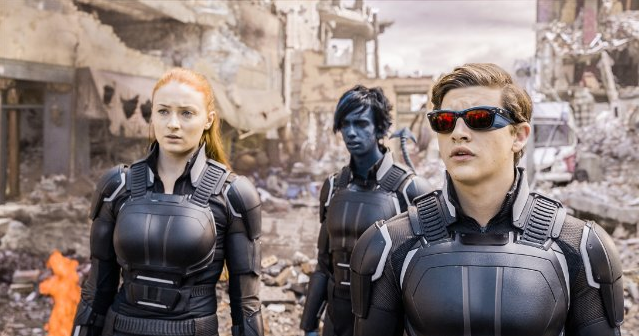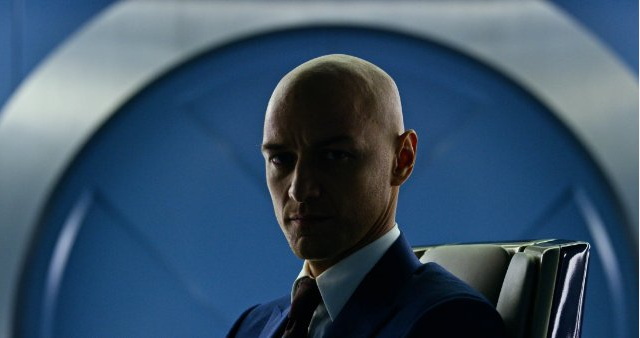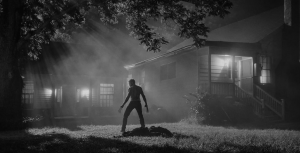A surprisingly prescient scene occurs midway through Bryan Singer’s X-Men: Apocalypse that proves equal parts self-deprecating and predicting. A group of young mutants, led by Sophie Turner’s Jean Grey, leaves a showing of Star Wars Episode VI: Return of the Jedi (Apocalypse is set in the 1980s). One of them remarks that the third movie of a trilogy is always the worst. On the surface, this appears to be a shot at X-Men: The Last Stand, but the statement shows a self-awareness of Apocalypse’s own repetitive plot structure. The film entertains, but underwhelms because it feels far too similar to its predecessor, Days of Future Past.
The film’s story concerns the resurrection of the eponymous villain Apocalypse, played by Oscar Isaac under what looks like fifty pounds of makeup. Isaac has proven that he is one of the most charismatic and exciting actors in Hollywood, and yet he cannot sufficiently bring Apocalypse to life. The fault does not lie with Isaac, however. The script, written by X-Men veteran Simon Kinberg, does him no favors. Apocalypse’s motivation, generic world domination, is childish, and he spends much of the movie just standing around having others do his dirty work for him. Additionally, the character’s voice feels far too edited and overdone (even Bane’s voice was subtler than this). There is no real menace to Apocalypse at any point in the film until the end, when the character is finally given some actual weight and is able to show his abilities. Unfortunately, it is too little, too late. The film’s greatest sin is somehow making Oscar Isaac boring.
Part of the issues with Apocalypse’s character stems from the film’s scale. Singer goes completely overboard with the amount of CGI-rendered destruction shown on screen. The CGI does not look particularly convincing, and the vast amount of civilian collateral damage is completely ignored at the conclusion of the film. With that being said, Singer does have a knack for staging good battle scenes, and the film’s climax, set in Egypt, allows for each character to show off their powers. It may not completely have the epic feel that Singer is striving for, but it is still satisfying to see the X-Men team up to fight against Apocalypse and his Four Horsemen.
If Apocalypse is an underwhelming villain, then the rest of the characters in the film are extremely shortchanged. The newest and most important addition to the story, Turner’s Jean Grey, fails to compel and spends so much time struggling to maintain an American accent that she forgets to give the character any life. Fortunately, Kodi Smit-McPhee Nightcrawler is an absolute blast. Singer makes creative uses of his power, and he is one of the few newcomers who does an excellent job with his role. The returning cast, highlighted by James McAvoy’s Professor X, Michael Fassbender’s Magneto, and Evan Peters’ Quicksilver all do a commendable job. Much like in Days of Future Past, Quicksilver gets a set piece that steals the show involving an explosion in the X-Men mansion, and it is worth the price of admission. It may not be quite as good as the Days of Future Past’s “Time in a Bottle” sequence, but Peters proves that his character is the most entertaining in the film.

IMDb
Indeed, the majority of Apocalypse feels like a retread of Singer’s greatest hits as an X-Men director. The novelty of seeing our favorite characters all on the screen together is gone, and it is replaced by a sinking feeling that Singer is just giving us more of the same. Magneto has a tragic introduction into the story, but his arc then descends into the same ambiguity that has dominated his character in the past: he is a tragic hero, then a villain, then a hero again, then a villain, and so on. Where Days felt inspired and innovative, Apocalypse just feels sluggish. There is certainly enjoyment to be had, and the entire film has a sense of goofiness and self-awareness that makes the proceedings a fun enough ride, but in the end, Apocalypse is better off as a one-time viewing. When Oscar Isaac cannot inject a film with any life, it certainly is a sign of the apocalypse. (https://aaronkirman.com/)






